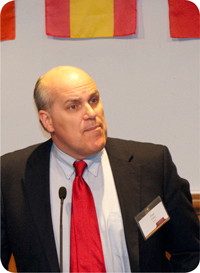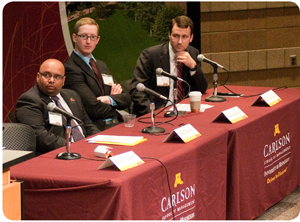
Full-Time MBA Students Embark on Global Discovery
Friday, April 1, 2011
By Steve Rudolph
At a time when many students around the world were still ringing in the new year, the second-year cohort of the Carlson School’s Full-Time MBA program traveled the globe to not only broaden their horizons, but help area companies gain a broader understanding of conducting business in emerging markets.
Carlson School student visits to the emerging markets of Chile, China, and Turkey (along with one group visiting Silicon Valley) were the second component of a new Global Discovery course that integrates classroom, clinical field visits, and interactive symposium-based learning around a single topic touching on management and international business.
The inaugural class, Winning Strategies for Minnesota Business and Trade in Emerging Markets, focuses on managing businesses in emerging-market countries, how Minnesota firms can succeed in these markets, and how firms in the emerging-market countries can enter and thrive in the state and surrounding area.
“The rules of the business game are not well settled in emerging markets,” says Associate Professor Paul Vaaler, course coordinator and field work faculty leader for the group that traveled to Turkey. “Global Discovery is about bringing our students— our budding professionals—to that Dodge City of the world where opportunities as well as dangers are rife, and letting them know there’s a broader business community for them to engage.”
For the course, the Carlson School enlisted several prominent Minnesota-based multinational corporations such as 3M, Cargill, Ecolab, Hormel, and Medtronic to provide insight on challenges and opportunities they deal with in emerging-market countries. At each destination, the students conducted site visits, met with local political leaders to understand the political situations of these areas, and interacted with various business groups, including local chambers of commerce and organizations for expatriate business executives and entrepreneurs.
“When we visited these companies abroad, we were meeting with their A-squads,” says John Young, ’11 MBA, who traveled to Turkey. “We were exposed to not just the day-to-day operations, but the overall strategy and what the managers are thinking. This gave us a chance to understand that when you do go abroad you might be expected to bring a different set of resources, a different set of tools than you need domestically.”
Lessons Abroad Shared with Local Community
Following their return, the students shared their findings with the public in an effort to help Minnesota, Iowa, North Dakota, and South Dakota companies more effectively conduct business in emerging markets. Sponsored by the University of Minnesota’s new Center for International Business Education and Research (CIBER), Global Discovery Symposium: Emerging Markets – Opportunities and Challenges, focused on the themes of risk, innovation, and governance.
“With the addition of CIBER to our existing portfolio of international initiatives, we are able to provide further outreach to all of our constituents,” says Michael Houston, associate dean of International Programs.
Visiting with entrepreneurs both in the Twin Cities and Silicon Valley allowed Raj Chavali, ’11 MBA, and his classmates the opportunity to observe the important role an acceptance of failure plays in sparking innovation.
“As we heard in the panels today, countries like Chile and China are not there in terms of accepting the risks of innovation,” says Chavali. “We hope our presentations shed some light into some of the advantages area businesses would have in emerging markets and made them aware of some of the risks.”
A mixture of business and government officials listened to the symposium’s panel discussions, which were held in February at the Carlson School.
“The presentations were very interesting for me because there were a bunch of different perspectives, not only from the students but different companies,” says Jordan Hanlon of Skyline Design in Eagan, Minn., who attended the symposium to gain insights that might help his employer expand. “It was a good opportunity for me to learn more about some different markets.”
According to Vaaler (pictured at left), programs like Global Discovery can serve an important role in growing the region’s international trade and business presence.
"It’s a difficult thing for a U.S. Commercial Service Officer to be everywhere at once, much as it is for a business professional at a major multinational,” Vaaler says. “Our students can be the eyes and ears of what’s happening on the ground in some of the most exciting business environments for those officials and executives. I heard that in the feedback from those who visited with us today at the symposium.”
Minnesota Trade Office Deputy Director Ed Dieter, who also attended the Global Discovery Symposium, was impressed with the Carlson MBA students’ observations on emerging markets and excited about CIBER’s future impact on the state, particularly the center’s focus on less-commonly taught languages and research.
“No one else is looking at some of the research topics CIBER has discussed,” says Dieter. “The basic research that happens here at the University can be a critical piece in the creation of new multinational companies here in the state.”
Classroom Component was Foundation of Holistic Learning
To prepare for their travels, the students received extensive classroom preparation in which they reviewed analytical models and technical measurement approaches to understanding how multinational corporations view risks associated with investing in emerging-market countries, studied economic policy trends across emerging-market countries, and analyzed political business cycles.
Sri Zaheer, associate dean of Faculty and Research, says the interdisciplinary Global Discovery class was established to further emphasize the school’s commitment to both experiential learning and the international experience.
“It is our hope that providing our students with first-hand exposure to businesses and leaders in these countries will prepare them for the exhilaration and the challenge of doing business in these countries,” she says.
“When you combine the pre-departure class sessions and the in-country experiences followed by the symposium, we have a unique blend of activities no other business school offers,” adds Houston.
For many of the participants, Global Discovery brought classroom lessons to life while foreshadowing future careers.
“It really illustrated a lot of the points we read about and talked about academically,” says Lydia Gokey, ’11 MBA, of her trip to Chile. “I’m hoping to work internationally, so this fit really nicely into where I want to go when I finish my MBA.”
Her classmate Raj Chavali agrees. “Global Discovery completed my education in many ways. We’ve sat through a year and a half of classes and really learned about strategy and learned about marketing aspects. To be able to go see these ideas brought to life by entrepreneurs was a powerful experience.”

